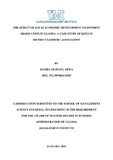| dc.description.abstract | The purpose of this study was to assess the effect of Local Economic Development (LED) on poverty
eradication in Uganda using a case study of Kitgum District Farmers’ Association (KIDFA). The
following objectives guided the study; to assess the effect of the responsiveness of LED intervention
on poverty eradication in districts, to assess the extent to which the coordination of implementation of
LED intervention has affected poverty eradication in districts, to assess the level of participation of the
key players in the implementation of the LED intervention on poverty eradication in districts and; to
establish how the legal and governance environment contributes to the effect of LED on poverty
eradication in districts. This study used a descriptive survey research design, which was cross-section
in nature adopting both qualitative and quantitative approaches. The sample size was 295 but the
response was 228 (a response rate of 77%). Purposive sampling was used to select KIDFA board of
directors and KIDFA coordinator. Simple random sampling was used to select KIDFA staff and
farmers. Quantitative data was analyzed using descriptive statistics (frequencies and percentages) and
inferential statistics (correlations and coefficient of determination). Qualitative data analysis involved
content analysis. Study findings revealed a positive strong correlation (rho = .767) between
responsiveness of LED intervention, a very strong positive correlation (r = .867) between coordination
of implementation of LED intervention, and a strong positive correlation (r = .740) between level of
participation of the key players in the implementation of the LED intervention and poverty
eradication. However, the legal and governance environment did not significantly contribute to the
effect of the responsiveness, coordination and the level of participation of the key players in the
implementation of the LED intervention on poverty eradication. It was concluded that the
responsiveness, coordination and participation of key players significantly affected the effects of LED
on poverty eradication. It is recommended that key stakeholders improve the responsiveness by
making community to gain more control of the LED activities, local government should improve
coordination through proper allocation and monitoring of LED resources, and should improve
participation through actively engaging all relevant stakeholders. | en_US |

